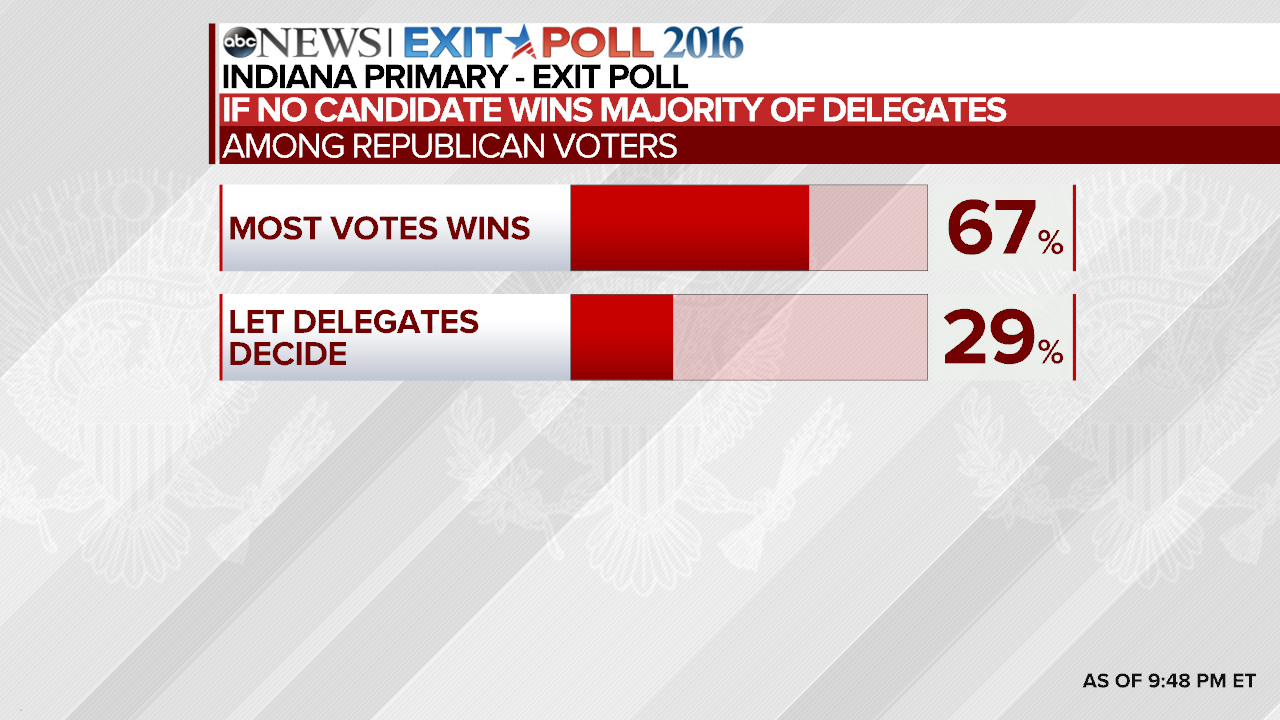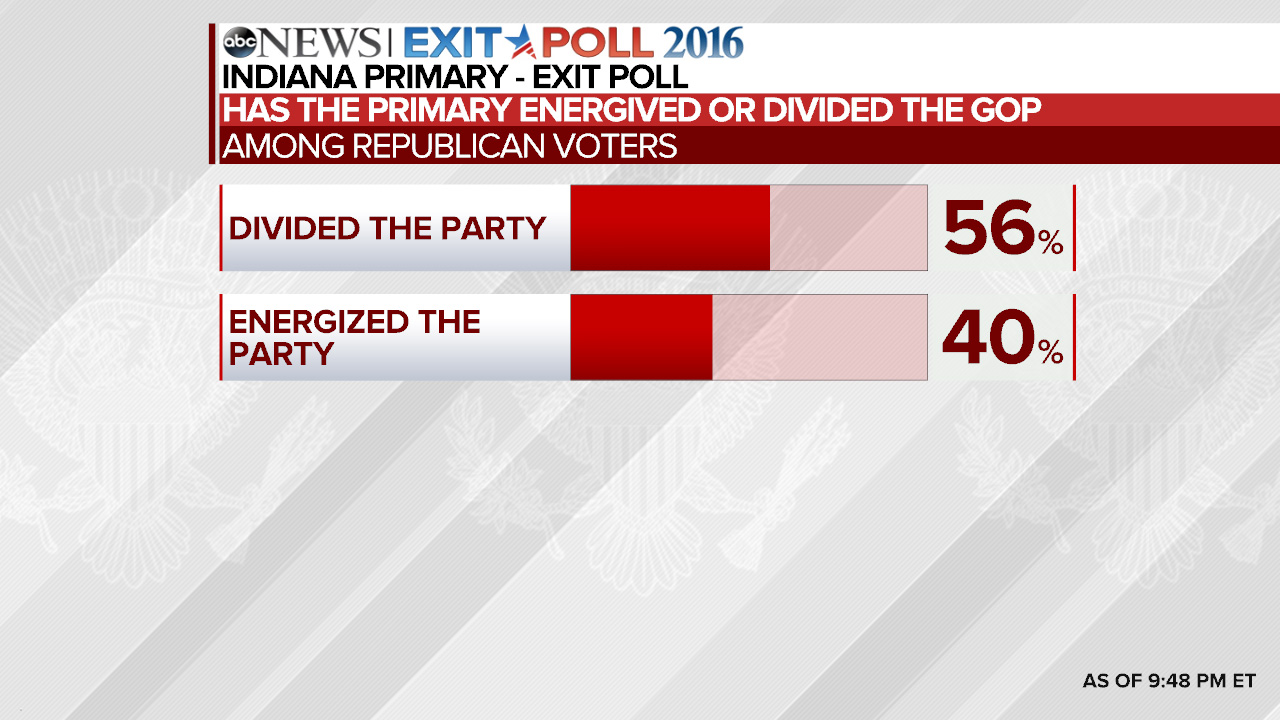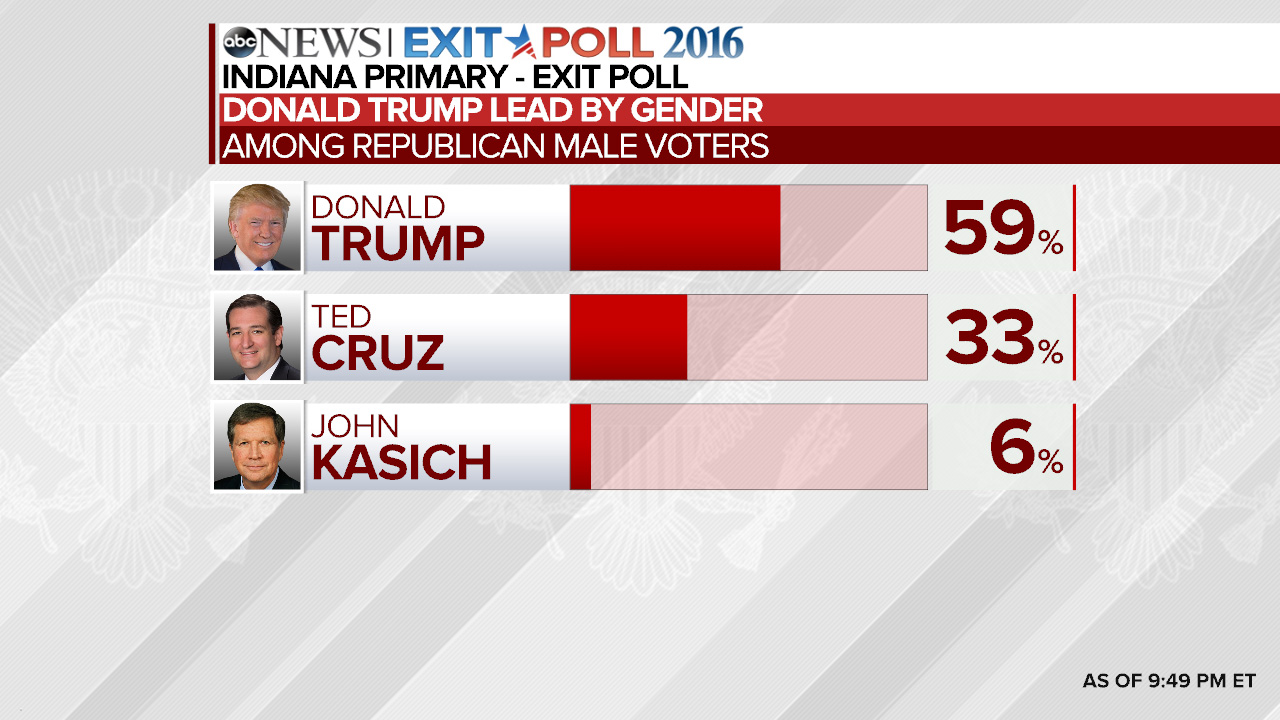Indiana Republican Primary Exit Poll Analysis
Who turned out in Tuesday's Indiana primary?
— -- Preliminary exit poll results from Indiana’s Republican primary show a party that still is deeply divided, but with enough favorable attitudes for Donald Trump’s campaign to lift him to victory. Those included greater-than-average support for an outsider candidate and for deporting undocumented immigrants, as well as – typically this year - majority interest in a candidate who’ll “bring needed change” or “tells it like it is.”
Issues: Six in 10 Indiana GOP primary voters said they want the next president to be someone from “outside the political establishment,” Trump’s calling card, and he overwhelmingly won their votes. Turnout among outsider voters, preliminarily, was close to its highs this year – all in states that Trump won.
Trump hasn’t won majority support for another of his issues – deporting undocumented immigrants – but it’s nevertheless drawn substantial support among GOP voters. Fort-five percent said they favored deportation, compared with 41 percent in previous races on average.
Trump’s also done well in previous primaries among economically and politically distressed voters. Today in Indiana seven in 10 say they’re “very” worried about the direction of the economy, about average this year. Somewhat fewer, though, express anger with the federal government – about a third in these preliminary exit poll results, compared with 40 percent on average previously.
One issue that looks not to be resonating for Trump is his contention that the GOP’s nomination process is “rigged.” In preliminary exit poll results in Indiana, only a third of voters agree with him.
In another aspect of fairness, Cruz is doing much less well in perceptions that he’s run the most unfair campaign than he has previously. More in Pennsylvania said he’d run the most unfair campaign, a sharp contrast to the 13 previous states where the question was asked, where far more thought Trump had been more unfair than said so about Cruz, 42 vs. 25 percent. Indiana voters were a lot closer to Pennsylvania voters – 41 percent said Cruz ran the most unfair campaign, vs. 36 percent for Trump.
Attributes: Attributes that have driven Trump’s campaign so far resonated as well in Indiana as in other states. More than half of Indiana voters said they wanted a candidate who can “bring needed change” or who “tells it like it is, and Trump won six in 10 and nine in 10 of their votes, respectively. Ted Cruz came back with voters focused on a candidate who shares their values – a persistent Trump weakness – winning two-thirds in this group; there just weren’t enough of them.
Time of decision: Another big help for Trump, per usual, were the supporters he’d locked in a long time ago. Forty-five percent of Indiana’s GOP primary voters said they made up their minds more than a month ago, and they voted for Trump over Cruz by more than 2-1.
Convention fight: Looking forward to the convention, two-thirds of Indiana GOP voters said they think that if no candidate has reached a majority of delegates before the convention, the one with the most votes should win the nomination, vs. three in 10 who said the delegates should decide at a contested convention. Support for a contested convention peaked among supporters of Cruz and John Kasich, but notably, early exit poll results indicated that it’s slipped slightly from previous primaries.

GOP unity: Regardless, animosity within Republican ranks was on display again. As in New York and Pennsylvania, a majority of Indiana GOP primary voters – nearly six in 10 in preliminary exit poll results – said the campaign has mostly divided the party, vs. four in 10 who think it’s “energized” it. Trump supporters were most likely to say the contest has energized the party, while those supporting Cruz were much more apt to say the party’s been divided.

This result contrasts sharply with views on the Democratic side, where – again as previously – many more say the campaign has energized than divided the partly, Hillary Clinton and Bernie Sanders supporters alike.
Excitement/fear: Trump’s supporters are more excited than Cruz’s about the prospect of their candidate winning the presidency. At the same time, Cruz and Kasich supporters are more fearful of a Trump presidency.
Looking ahead to November: GOP divisions also were highlighted by the number of non-Trump supporters in Indiana who said they wouldn’t vote for Trump as the nominee (half) and the share of non-Cruz supporters who said they would not vote for Cruz if he were the nominee (four in 10) – higher alienation rates than on the Democratic side.
Midwestern demographics: Based on preliminary exit poll results, among key GOP groups, a third are “very” conservative, six in 10 are evangelicals and a majority attends church weekly. Still, weekly churchgoing evangelicals – a better group for Cruz in the past – account for well under half of all Indiana GOP primary voters, about four in 10.

One point we’d add is a notable gender gap in Trump’s support. Per the preliminary exit poll results, he’s won men by 23 points over Cruz, 57-34 percent, but women by just a slim 4 points, 46-42 percent.In previous contests on average Trump has been +18 points vs. Cruz among men, +9 among women. While the gap’s existed, it’s been bigger than in Indiana today in just one state previously, Michigan.